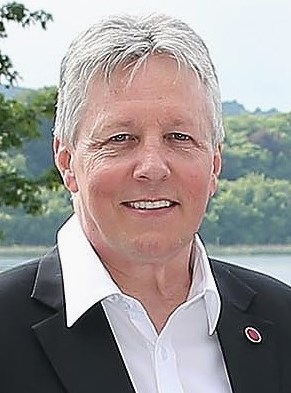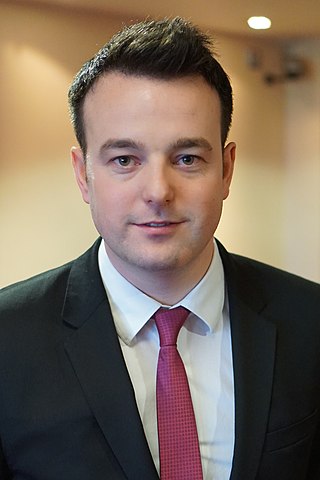
The Ulster Unionist Party (UUP) is a unionist political party in Northern Ireland. The party was founded as the Ulster Unionist Council in 1905, emerging from the Irish Unionist Alliance in Ulster. Under Edward Carson, it led unionist opposition to the Irish Home Rule movement. Following the partition of Ireland, it was the governing party of Northern Ireland between 1921 and 1972. It was supported by most unionist voters throughout the conflict known as the Troubles, during which time it was often referred to as the Official Unionist Party (OUP).

The Northern Ireland Assembly, often referred to by the metonym Stormont, is the devolved legislature of Northern Ireland. It has power to legislate in a wide range of areas that are not explicitly reserved to the Parliament of the United Kingdom, and to appoint the Northern Ireland Executive. It sits at Parliament Buildings at Stormont in Belfast.

The UK Unionist Party (UKUP) was a small unionist political party in Northern Ireland from 1995 to 2008 that opposed the Good Friday Agreement. It was nominally formed by Robert McCartney, formerly of the Ulster Unionist Party, to contest the 1995 North Down by-election and then further constituted to contest the 1996 elections for the Northern Ireland Forum. McCartney had previously contested the 1987 general election as an independent using the label Real Unionist.
Robert Law McCartney, KC, known as Bob McCartney, is a Northern Irish barrister and Unionist politician who was leader of the UK Unionist Party (UKUP) from 1995 to 2008.
Sir James Alexander Kilfedder, usually known as Sir Jim Kilfedder, was a Northern Irish unionist politician.
The Ulster Popular Unionist Party (UPUP) was a unionist political party in Northern Ireland. It was founded in 1980 by James Kilfedder, independent Unionist Member of Parliament for North Down, who led the party until his death in 1995. For a brief period in 1980, it was known as the Ulster Progressive Unionist Party before it adopted the "Popular" name.

James Hugh Allister is a Northern Irish politician and barrister who has served as Member of Parliament (MP) for North Antrim since the 2024 general election. He founded the Traditional Unionist Voice (TUV) in 2007 and has led the party since its formation. Prior to his election to Westminster, Allister was a member of the Legislative Assembly (MLA) for North Antrim, having been first elected in the 2011 Assembly election.

South Antrim is a parliamentary constituency in the United Kingdom House of Commons. The current MP is Robin Swann of the Ulster Unionist Party (UUP), first elected in the 2024 general election.

Belfast North is a parliamentary constituency in the United Kingdom House of Commons. The current MP is John Finucane.

Reginald Norman Morgan Empey, Baron Empey,, best known as Reg Empey, is a Northern Irish politician who served as the acting First Minister of Northern Ireland in 2001. He was the leader of the Ulster Unionist Party (UUP) from 2005 to 2010 and served as chairman of the party from 2012 to 2019. Empey was a Member of the Northern Ireland Assembly (MLA) for East Belfast from 1998 to 2011.

Hugh Smyth OBE was a Northern Irish Ulster Loyalist and politician who was leader of the Progressive Unionist Party (PUP) from 1979 to 2002, as well as during an interim period in 2011. He was Lord Mayor of Belfast from 1994 to 1995, as well as a Belfast City Councillor for the Court and Belfast Area E DEAs from 1972 to January 2014, making him one of the longest-serving members on the Council. Smyth was awarded the Order of the British Empire in the 1996 New Year's Honours list.

The 2007 Northern Ireland Assembly election was held on Wednesday, 7 March 2007. It was the third election to take place since the devolved assembly was established in 1998. The election saw endorsement of the St Andrews Agreement and the two largest parties, the Democratic Unionist Party (DUP) and Sinn Féin, along with the Alliance Party, increase their support, with falls in support for the Ulster Unionist Party (UUP) and the Social Democratic and Labour Party (SDLP).
Cedric Wilson is a former Northern Irish unionist politician who was leader of the Northern Ireland Unionist Party (NIUP) from 1999 to 2008, and a Member of the Legislative Assembly (MLA) for Strangford from 1998 to 2003.
Denny Vitty is a Northern Irish unionist politician.
Roger Hutchinson is a former Northern Irish unionist politician and church minister who was a Member of the Northern Ireland Assembly (MLA) for East Antrim from 1998 to 2003.
Patrick J. "Paddy" Roche is a former Northern Irish unionist politician and banker who served as Deputy leader of the Northern Ireland Unionist Party (NIUP) from 1999 to 2008, and was a Member of the Northern Ireland Assembly (MLA) for Lagan Valley from 1998 to 2003.

The 2010 United Kingdom general election in Northern Ireland occurred on 6 May 2010 and all 18 seats in Northern Ireland were contested. 1,169,184 people were eligible to vote, up 29,191 from the 2005 general election. 57.99% of eligible voters turned out, down 5.5 percentage points from the last general election.

The 2005 United Kingdom general election in Northern Ireland was held on 5 May 2005 and all 18 seats in Northern Ireland were contested. 1,139,993 people were eligible to vote, down 51,016 from the 2001 general election. 63.49% of eligible voters turned out, down 5.1 percentage points from the last general election.

The 2017 Northern Ireland Assembly election was held on Thursday, 2 March 2017. The election was held to elect members (MLAs) following the resignation of deputy First Minister Martin McGuinness in protest over the Renewable Heat Incentive scandal. McGuinness' position was not filled, and thus by law his resignation triggered an election.











